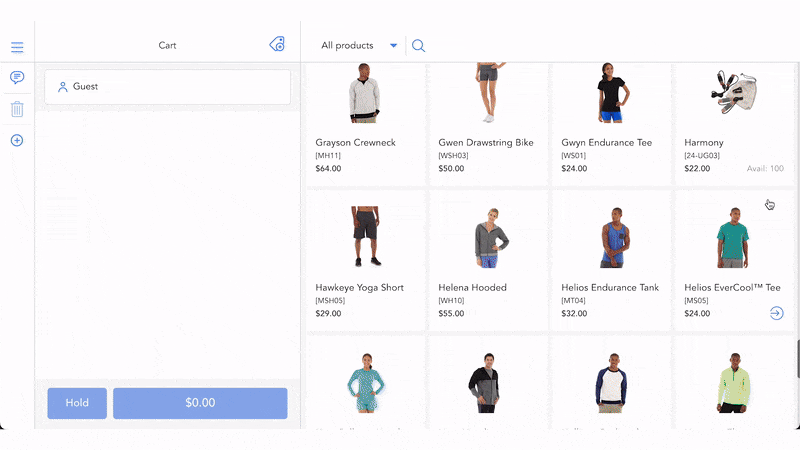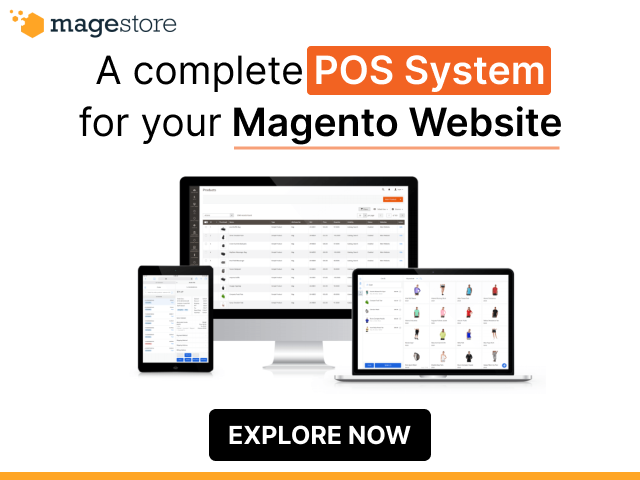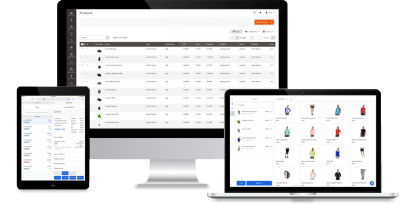OMS stands for Order Management Software. Order management software in the retail industry is an advanced tool that tracks sales, inventory, customer orders, and fulfillment. It allows retailers, logistic partners, and customers to track the status of the products sold. All retail order data and processes are automated, from receiving, routing, fulfilling, shipping, tracking, notifying, and returning or exchanging products.
A modern order management system touches multiple aspects of your business operation, including sales channels, product information, customer service, inventory control, supplier management, and order fulfillment.
Choosing an OMS requires careful consideration. The system must fit your scope of retail, help you save time, reduce costs, and improve customer experience. Let’s explore the essential features of a retail OMS and the top 5 order fulfillment software you can select from.
What are the features of a good order management system?

Track inventory in omnichannel
Omnichannel sales have become critical to reach and engage with target customers. It offers many ways to purchase products, such as in-store, online, or via O2O methods like click and collect. Therefore, the OMS should be able to unify and control inventory data across channels. It means tracking the stock volume, velocity, and order fulfillment if you want scalable growth.
With a retail OMS, you can:
- See real-time updates on inventory data across channels;
- Check which SKUs are your best sellers and when to restock;
- Measure your sales performance and gain insights into your products.
Automate the order fulfillment process
OMS creates an interconnected supply chain system where retailers can automate the fulfillment process from customer orders to delivery. Here is how a retail management system can help merchants push their order processing:
- Handle different payment methods and currencies;
- Send order information to 3PLs or 4PL for fulfillment;
- Automatically print shipping labels for in-house processing.
Manage reverse logistics
Reverse logistics means a customer returns an item to your warehouse through a refund, exchange, or credit note. This aspect should receive the same attention as the packing and shipping processes to provide customers with a fast and convenient experience. With ordering management software, controlling product returns is now easier than ever. You will:
- Print return labels automatically with the auto-filled address of the customer;
- Let customers and retailers track the status of the product returns;
- Update inventory levels automatically when retailers receive the returned products.
Control customer data
Software for order management helps you control all customer data, including their demographics, location, historical purchases, and lifetime value. Merchants can gain insights into customer behaviors and preferences to personalize content and marketing offers. For example, you can divide customer segments based on locations, order value, or cart reminders.
Integrate order and financial data
An OMS should be able to integrate with other back-office functions like accounting software. The OMS can pull financial information from the accounting software and merge it with inventory and sales data. You can determine the product lines and the customer segments that are driving revenue and how to generate more profits. Besides, it automates invoice and PO creation, saving you from repetitive manual tasks.
5 best order management software for retailers
Now you know what you should look for in a system for order management, it’s time to find the one that best suits your needs. We’ve summarized the top 5 software for you based on business scale, features, and pricing. Let’s dive in.
Magestore OMS

Magestore recently released an all-in-one retail management system (RMS) that offers many built-in functionalities, such as inventory management, order fulfillment, and warehouse management. The system is native to Magento and inherits all eCommerce powers with extensive integrations.
Order management is an app without backend access inside Magestore RMS. It syncs all order data in real time, helps retailers deliver an outstanding shopping experience for both in-store and online customers with its order fulfillment, store pickup, and dropship features. Here are the highlight features of Magestore OMS:
Features:
Streamline the order fulfillment process with large order numbers:
- Control orders across sales channels and warehouses in a fully-integrated system to prevent entry errors
- Simplify your order fulfillment workflow with 5 steps for efficiency and speed: Verify, Prepare, Pick, Pack, and Deliver
- Use barcode to track item status
- Search for orders easily with filters by tag, status, and batch
- Evaluate business performance with reports by staff and location
Create more sales opportunities:
- Omnichannel order management with Click and Collect, where customers buy online and pickup at store
- Create and edit all store location information like name, address, date, hours, and display them on the listing page and Google Maps
- View your Click and Collect orders on the app screen or in Magento backend
Use dropshipping to save inventory costs:
- Progress dropship orders with 3 steps: Request, Confirm, and Create shipment
- Manage order status with real-time updates and email notifications
- Offer accounts and listing pages for suppliers
Sync all data from inventory and warehousing systems, easily integrate with POS system and analytics tools to build a complete retail ecosystem.
In addition, Magestore is a fully-integrated platform that also works as an order tracking system, sales order management software, and purchase order management software. It lets store owners track their sales, order shipping status, and alert which stock should be replenished to generate purchase orders.
Pros:
- Add unlimited stores and users
- Ability to fully customize the OMS to suit your business needs
- The Magento Order Management PWA is fast, stable, and secure for you to track and process orders without logging in to the backend
- Integration with all Magento’s partners
Cons:
- The software is complicated to set up on your own but Magestore team will handle this task.
Pricing:
As the software price differs based on your scale and requirements, you’ll need to contact Magestore for a custom quote.
Shopify Plus

Shopify Plus is a cloud-based order management system for eCommerce. It is designed with scalability for growing businesses and enterprises with thousands of transactions per minute. Retailers can control orders in one central dashboard, no matter where customers purchase products: in-store, on an international website, or app.
Shopify Plus provides many powerful features to let your site perform fast and accurately, creating a pleasant shopping experience for customers.
Features:
- Support omnichannel sales for both online and offline stores, localize user experience with global storefronts
- Accelerate and customize the checkout methods with Shopify’s POS system
- Automate inventory management: control product information, oversee stock levels, optimize replenishment
- Fulfill orders quickly with its 3PL service called Shopify Fulfillment Network (SFN) to smoothly handle your orders with synced data from inventory and sales
- Create personalized offers to customers based on tagging and segmenting, and allow merchants to cancel high-risk or fraudulent orders
- Wholesale channel management: Create private online stores, customize orders and wholesale pricing for B2B customers across multiple marketplaces
- Create complex scripts for your marketing campaigns, such as gifts for a certain purchase value, discounts for specific items, free shipping, loyalty tokens, etc
- Control high-volume orders in flash-sale campaigns with Shopify Plus Launchpad tool: Real-time monitoring for top-selling products, total transactions and revenue, acquisition channels, and conversion rates
Pros:
- Unlimited bandwidth and process up to 8,000 orders per minute, per store
- Manage up to 10 stores at once
- Unlimited integrations, extensibility, and customization through Shopify App Store
- Custom automation with in-built apps such as Launchpad, Shopify Flow, and Scripts
Cons:
- Learning curve is quite difficult that requires your knowledge of the Shopify Language Liquid
- 3rd party analytics tools are tricky to integrate and use unless they are Shopify’s partners
Pricing:
Shopify Plus starts at $2,000 per month to get the standard features and integrations to manage your business. If you have a complex, higher selling volume, the variable fees will be applied based on your requirements.
Veeqo

Veeqo is a part of Amazon’s family that handles order management seamlessly for eCommerce retail businesses. It is specialized in shipping services and simplifies your order fulfillment with powerful inventory tools. It offers multi-currency functions and allows you to control and ship orders around the world. All data is centralized in your US sales channels.
Features:
- Automate your shipping process: tag orders, print templated order forms and invoices, attach internal notes and shipping carrier on each order, and track the order execution status
- Sync data from all your sales channels including, websites, marketplaces, and physical stores
- Real-time update of inventory across channels to maintain accurate counts and avoid backorders or out-of-stock situations
- Fast bulk shipping within a few clicks by automatically selecting the best rates and shipping up to 100 orders at once
- Warehouse management: Manage bin locations, regular cycle counting, and employee management
- Process sales from multi-channel stores and get orders packed and shipped from mobile devices
- Integrate with various eCommerce platforms like Amazon, Shopify, Esty, and eBay to sync inventory data
- Offer analytics and detailed reports on your product data and identify patterns with filtering tools like total sales, sales by location, product and bundle margins, inventory levels, supply chain movement, etc
- Provide a forecasting tool to predict and plan for future restocking
Pros:
- Easy-to-use platform with a intuitive user interface
- Comprehensive integrations with other eCommerce platforms, POS systems, and marketplaces
Cons:
- Technical difficulties in implementing and onboarding the software, which requires Veeqo support
Pricing:
Veeqo is free! Veeqo says they benefit from shipping volume with their partner shipping carriers. Thus they offer free service for online merchants with unlimited users, unlimited orders, no monthly cost, and no shipping label limits.
Brightpearl

Brightpearl is a business management platform compatible with large online sales channels like Shopify, BigCommerce, Amazon, and eBay. It is developed with strong functionalities like automated order fulfillment, omnichannel sales, returns management, and POS integration.
Brightpearl serves as ERP software that helps you expand your business as your order volume goes from 1,000 to 30,000 per month. Therefore, it blurs the line between an OMS and ERP and works best for medium to corporate companies that require a full spectrum of business management.
For order fulfillment features, Brightpearl helps efficiently manage your orders by automating the receiving, picking, packing, and shipping of products with invoicing and payment workflows. With automation tools for repeated tasks, you can focus on the special orders that need your attention.
Features:
- Provide a single central hub to control orders from both online and offline stores with ease
- Simplify inventory management processes with real-time updates of inventory levels and reorder statuses, and sync with order data
- Standardize order fulfillment plans, including order data, sales channels, shipping methods, etc
- Generate inventory audit trails and cash flow reports in real time
Shipping management: You receive an order and perform the fulfillment tasks to deliver the products. Customers will be notified by email with tracking references. After the customer gets the package, Brightpearl will update the revenue, profit, and inventory cost of the orders - Handle different types of fulfillment options: drop shipping, partial fulfillment, multi-location fulfillment, or fulfillment by Amazon
- Create business reports in various aspects: sales, inventory, orders, customers, and employees
Pros:
- Easy to use
- Integrate with a wide range of features like inventory management, warehouse management, accounting, POS, CRM, and more
Cons:
- Some functions may experience glitches
- The retail OMS can be expensive to acquire more features beyond the basic plan
Pricing:
You can contact Brightpearl for a customized quote
Skubana (Extensiv Order Manager)

Skubana (now Extensiv Order Manager) is an eCommerce-oriented ERP system that covers more than your OMS functionality, including sales channels management, order tracking, shipping capacities, inventory control, and complete reporting and analytics. You can purchase materials, bundle goods, and fulfill orders — everything you need within the software.
Skubana is a powerful cloud solution that streamlines online selling for retailers while also supporting wholesale, direct-to-customer (DTC), and offline stores. If you sell on Amazon, Big Commerce, Shopify, or other big eCommerce platforms, Skubana offers you all the essential tools to grow your store.
Features:
- Manage orders accurately, track the shipping status, and sync all data with sales, inventory, and customers
- Skubana dashboard: View all statistics of your business, including your channels, warehouses, stock levels, orders, and products in one central dashboard, generate reports, and get insights to improve your performance
- Compare stock prices from multiple suppliers and marketplaces
- Automatically send orders to fulfillment centers
- Provide inventory forecasts based on your selling history
- Manage inventory across channels and warehouses for inventory accuracy: track items in stock and items in order, move stock between different warehouses and stores, handle orders and shipments with just a few clicks, and integrate with your 3PL logistics statistic and FBA distribution centers
- Analytics and Business Intelligence Tools: Track your sales and stock levels, and calculate your gross profit, unit margins, as well as hidden losses. The tools help you understand where you can cut costs and how to sell more
Pros:
- Plenty of features for online merchants
- Robust app store for 3rd party integrations
Cons:
- Basic features that are mainly suitable for small and growing companies
- The long and high learning curve to operate the system.
Pricing:
The price starts at $1,000/month for up to 1,000 monthly orders. You can contact Skubana team to design a customized solution that meets your order volume and business scope.
Which OMS system is best for your retail store?
Among many different retail order management solutions, which one will be your best fit? The right OMS for you should automate manual and time-consuming tasks from your order management workflow. Thus, you should check which features you need to choose a suitable one. Here is a summary table of the 5 shortlisted candidates based on their functionalities and pricing.
| Name | Best for | Pricing |
| Magestore | Best for overall retail management for all industries and company sizes. | Custom quote |
| Shopify Plus | Best for enterprises that need scalability and customization. | Start at $1/ month |
| Veeqo | Best for free eCommerce order fulfillment. | Free |
| Brightpearl | Best for medium to enterprise companies that have both online and offline orders. | Custom quote |
| Skubana | Best for small and growing businesses with various features on 1 single platform. | Start at $1,000/month |
FAQs
What is the process of order management?
There are 6 steps in an order management process:
- A customer places an order
- The retailer receives the order information
- Warehouse staff picks the correct products and quantity
- They pack the products into package
- Send the products to shipping
- Deliver the order to the customer
Is the order management system an ERP?
Not exactly. An OMS is developed explicitly for order management, while an ERP is a general business management solution that deals with all resources like supply chain, HR, accounting, manufacturing suppliers, and many more. An all-in-one ERP may include order management functionality.
Conclusion
Above are the reviews of the best 5 order management apps. Each one has its own strengths and drawbacks that are suitable for different business scopes and requirements. Some are designed for large corporates with a complete management ecosystem, and others work best for small and medium retailers. You should understand your needs and compare multiple order management solutions to pick the right one for your company.














